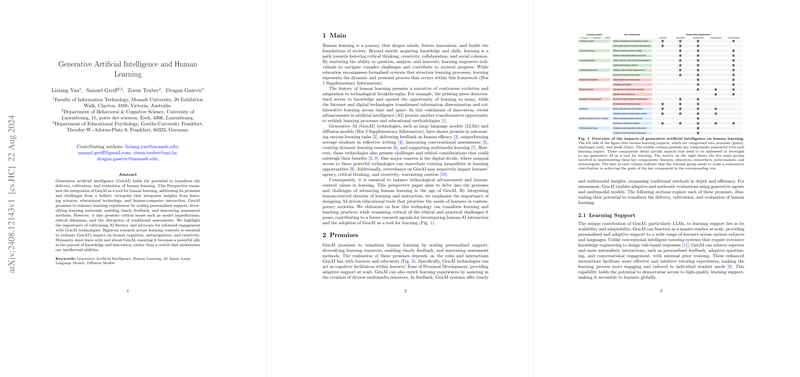Generative Artificial Intelligence and Human Learning: An Expert Overview
The paper "Generative Artificial Intelligence and Human Learning" by Lixiang Yan, Samuel Greiff, Ziwen Teuber, and Dragan Gašević provides a comprehensive perspective on the potential impact of Generative Artificial Intelligence (GenAI) on human learning. The authors present a holistic evaluation of GenAI's promises and challenges in the context of learning sciences, educational technology, and human-computer interaction.
Promises of GenAI in Human Learning
The paper highlights several key promises GenAI holds for transforming human learning:
- Scalable personalised support: GenAI can function as a cognitive facilitator by providing adaptive support at scale, thus democratizing access to high-quality learning assistance.
- Diversifying learning resources: GenAI can generate varied and engaging content, fostering curriculum innovation and enhancing learning experiences. It can create resources like instructional materials, interactive activities, and multimedia content efficiently.
- Timely and multimodal feedback: The ability of GenAI to deliver personalized, in-depth, and process-focused feedback instantaneously is emphasized as a significant advantage over traditional methods.
- Innovating assessment methods: GenAI can facilitate both adaptive and authentic assessments, enabling more precise and context-rich evaluations of student performance.
Challenges Associated with GenAI
Despite its potential, GenAI presents several challenges and ethical dilemmas that could overshadow its benefits:
- Model imperfections: Hallucinations and inaccurate outputs from LLMs can undermine the reliability and effectiveness of AI-driven learning tools.
- Ethical concerns: Issues of transparency, privacy, equality, and beneficence are paramount. The opaque nature of AI decision-making, risks of data breaches, language biases, and potential perpetuation of systemic biases are highlighted as critical concerns.
- Disruption of traditional assessment: The ability of GenAI to generate high-quality responses questions the validity of conventional assessment methods and necessitates a rethinking of evaluation strategies to genuinely measure human cognition and metacognition.
Future Directions and Needs
The paper outlines three pivotal needs for the effective integration of GenAI in human learning:
- Cultivating AI literacy: A foundational understanding of AI technologies, their limitations, and the potential impact is essential for learners, educators, and policymakers. AI literacy involves not just technological proficiency but also critical engagement with the ethical and practical implications of AI usage in educational settings.
- Evidence-based decision-making: Robust evidence and collaboration among researchers, practitioners, and policymakers are necessary to guide the effective integration of GenAI into educational practices. This includes understanding both the benefits and possible drawbacks of GenAI to maximize its utility in enhancing learning outcomes.
- Methodological rigour: Ensuring rigorous methodological standards in research is crucial. This involves developing specific quality standards and evaluation tools for GenAI applications to avoid overestimating effectiveness and addressing concerns such as data contamination and assessment reliability.
Conclusion
The paper emphasizes the dual approach needed for future learning practices involving GenAI: educating individuals both about and with AI, while fostering critical thinking, problem-solving, self-regulation, and reflective thinking skills to maintain cognitive and metacognitive autonomy. Understanding the interplay between GenAI and human cognition is vital for maximizing its potential as an educational tool.
Overall, the integration of human-centred theories and responsible AI practices, supported by the collaboration of researchers, policymakers, technology companies, and educators, is essential in harnessing GenAI's potential to advance human learning effectively. This balanced approach ensures that GenAI serves as an ally in education, enhancing rather than undermining human intellectual capabilities.
